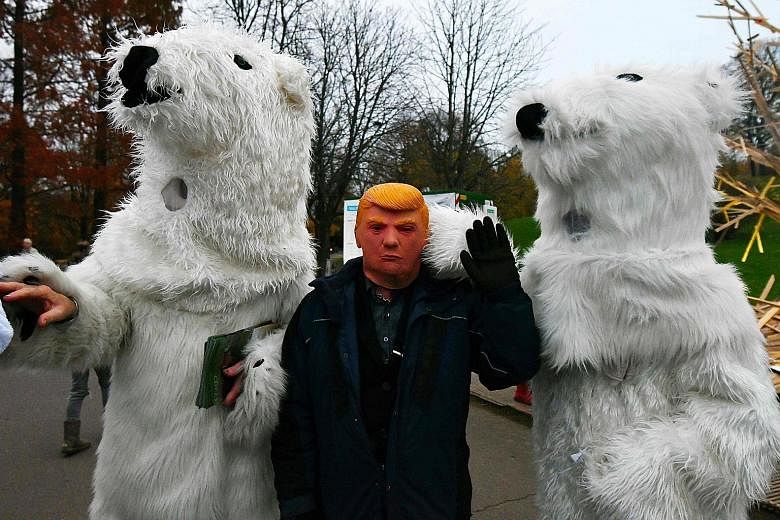BONN • United Nations negotiations on how to implement the climate-rescue Paris Agreement wrapped up in Bonn yesterday, after two weeks of talks unnerved by an American defence of fossil fuels.
President Donald Trump's decision to withdraw the United States from the hard-fought global pact cast a long shadow over talks marked by revived divisions between rich and developing countries.
Key disagreements revolve around how to share responsibilities for drawing down greenhouse gas emissions, and the money required to do so.
Not helping the mood, White House officials hosted a sideline event with energy company bosses on Monday to defend the continued use of fossil fuels - coal, oil and natural gas - that emit planet-warming and climate-altering gases when burned.
Unsettled by America's participation at the talks, delegates complained that not enough progress was made in developing a nuts-and-bolts "rule book" for executing provisions in the Paris Agreement, which enters into force in just three years.
"I have never seen a COP with so little adrenaline," a senior European negotiator said yesterday, referring to the 23rd Conference of the Parties to the UN climate convention.
The Paris Agreement, adopted to cheers and champagne in 2015, commits countries to limiting average global warming to under 2 deg C over Industrial Revolution levels, and 1.5 deg C if possible, to avert worst-case-scenario climate change.
Nations submitted voluntary emissions-cutting commitments to bolster the deal, championed by Mr Trump's predecessor, Mr Barack Obama. But scientists say current pledges place the world on course for warming of 3 deg C or more.
The predicted shortfall has grown by about 0.2 deg C since Mr Trump's announcement that Washington will abandon the pact, which it cannot legally do until November 2020.
The rule book, which must be adopted next year, will specify how countries count and report on their promised emissions cuts, which need to be upgraded in the coming years to bring them in line with the 1.5-2 deg C target.
"I don't think we've done enough here on the rule book," said Mr Mohamed Adow of Christian Aid, which represents poor countries' interests at the talks, citing a lack of "diplomatic leadership" since the departure of the Obama administration.
"We need to have Germany, France, the UK, Canada, New Zealand and Japan stepping up and providing real leadership that will actually help deliver the ambition of Paris."
Mr Alden Meyer, an analyst at the Union of Concerned Scientists, said a key dispute was money, with developing countries demanding more certainty and transparency from rich nations on their promise to raise climate finance to US$100 billion (S$135.6 billion) per year by 2020.
Developed nations, he said, "don't want to make three-or four-year projections of what they are going to provide, year by year. But the developing countries have dug in hard on this one".
AGENCE FRANCE-PRESSE

